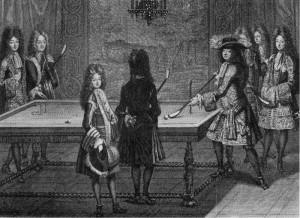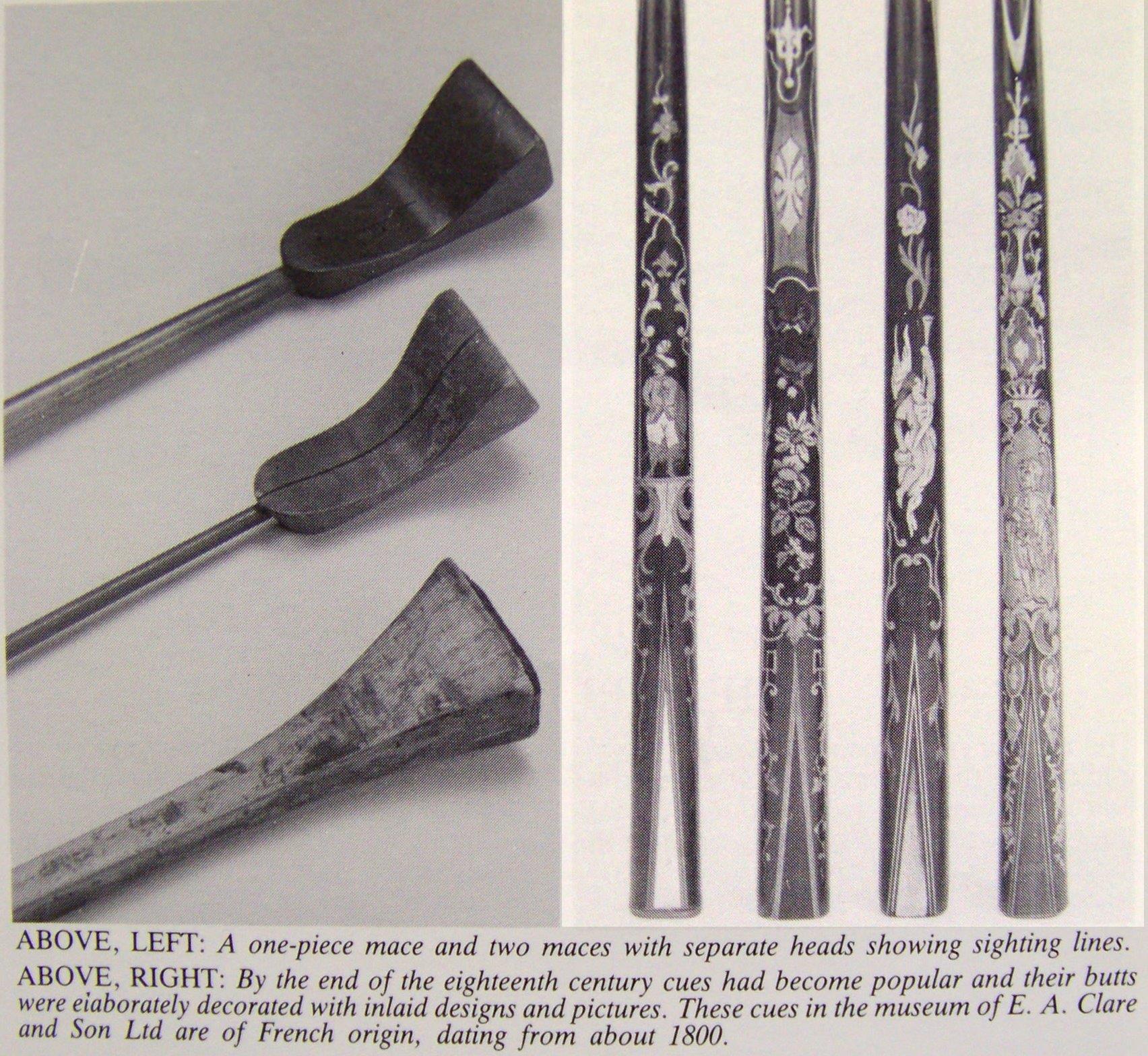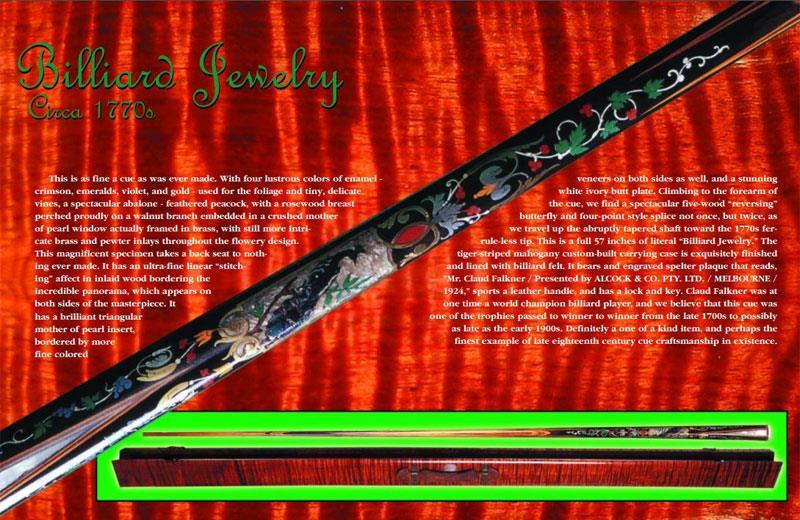Oldest Known Pool Cue Stick?
1/14/2018 12:46:38 PM
Oldest Known Pool Cue Stick?
I've been doing some research into the history of billiards cues and their predecessors, the mace. I am well aware of the history of BBC and other 19th century cue makers, so I am not asking for references to their work. I have found reference to a few handcrafted Portuguese cues made in the mid-18th century, and I have also found images depicting French monarchs playing with maces in the mid-15th century. I have been fortunate enough to hold a few maces over the years, but none had documentation that was readily available.
With that being said, does anyone know the definitive oldest "cue" or "mace" that has been preserved to modernity? Does anyone know if any institutions preserve these artifacts? I'd like to at least identify the oldest known surviving cues so that I can begin my research in depth.
Oldest Known Pool Cue Stick?
Replies & Comments
 billiardsforum on 1/14/2018 3:59:30 PM
billiardsforum on 1/14/2018 3:59:30 PMI really want to know what you find out on this. Your question made me realize how little I know of what is actually out there today.
I would say that most certainly you'll want to be looking outside of north america.
Here are a few resources:
- This article by Normal Clare: http://www.snookerheritage.co.uk/normans-articles/days-of-old/billiard-rules,-maces-etc/ - This shows 3 maces, 1 circa 1800, the other two, circa 1840. It has lots of good info on the use of the mace, and shows some rule-books from the 1700s which talk about when you are allowed to use the butt-end of the mace, etc. Reach the publisher at thurston@eaclare.co.uk
Also, you may want to reach out to Guy Huybrechts (guy.huybrechts@skynet.be) - a cue collector who has documented history on hundreds of French pool cues from the early 1800s era. The last link below is probably the one you are looking for.
- The section documenting his collection is here: http://users.skynet.be/billard.billiards/sum.htm
- He has a mace on this page: http://users.skynet.be/billard.billiards/rarecue.htm
- And he documents a good deal of history on the Mace here: http://users.skynet.be/billard.billiards/history.htm
It will at least be a starting place... it documents french pool cues from 1825 onward, but I suspect you have probably already found older.
But, this guy may be able to point you in the right direction.
Hope this helps and please share what you find in your research!
 billiardsforum on 3/1/2018 5:41:09 AM
billiardsforum on 3/1/2018 5:41:09 AMDid you ever get any further in your search for the oldest known pool cue? I am interested to learn what you found, if anything.
 ThriceGreat on 6/19/2018 11:14:52 PM
ThriceGreat on 6/19/2018 11:14:52 PMThe Guy Huybrecht source provided in the above comment is about the furthest I've gotten in my research about the history of the cue in Europe. It's a very good source of information and dates back pretty far.
I spoke to a cue collector who told me that some can be found in Washington D.C. in either the National Archives or the Smithsonian, but didn't know the dates.
This topic is something I'll continue to pursue, so if you see or hear anything more, don't hesitate to respond to this post!
 Chopdoc on 6/20/2018 9:37:24 AM
Chopdoc on 6/20/2018 9:37:24 AMI notice your avatar is a caduceus, are you a doctor?
There is a lot of history written about cue sports.
The answer could be difficult. What is a cue? Is a mace a cue? Etc.
The oldest preserved example? That's a great question. I don't know
It may be in private hands. There are some tremendous collections out there.
If I get time I'll look into it myself.
 ThriceGreat on 6/22/2018 2:50:45 PM
ThriceGreat on 6/22/2018 2:50:45 PMChopdoc,
I'm not a doctor. Pretty much the furthest thing from it. I am a cuemaker and cultural anthropologist / historian. The caduceus is often used to symbolize the field of medicine in the US, but it is believed by many that this was a mistake made by the US Military when they chose it to symbolize their medical division. The rod of Asclepius is more appropriate and can be found on the back of most ambulances, at least that I have seen.
As far as my education and research suggests, the caduceus is a symbol for commerce, thievery (hustlers), balance, and for me, the cue.
To answer your questions regarding my definition of a cue. When I say a cue, I would include any other cylindrical object with a rounded tip used to strike an object in a game, and I would count the maces and strikers used in dead sports such as lawn billiards, trucco, or any other cue sport as a cue.
I would not be surprised to learn that older cultures such as the Indians, Persians, Aboriginals, Greeks or Chinese had cue sports that have died out and been forgotten. Therefore, cues that have been potentially lost to time. The act of striking an object with a stick is a pretty fundamental relationship between man and his environment, as is competition between man and man. As someone who has studied anthropology extensively, it would also not be that surprising to learn that information regarding these sports and their cues has not survived to modernity.
With that being said, thanks for inquiring about my avatar. Please feel free to share knowledge of the collections you come across, as I am always interested in this sort of thing, no matter the age or geographic source.
Thanks again
 Chopdoc on 6/22/2018 7:47:01 PM
Chopdoc on 6/22/2018 7:47:01 PMThanks.
Yes, I am familiar with the history. Regardless, many have adopted the symbol in medicine, and it is commonly used.
Interestingly, my daughter was pursuing cultural anthropology at university, but she has since changed to education.
I will definitely keep my eyes peeled for anything that applies to your search.
I am a physician (surgeon actually), so when I saw your avatar, I thought to ask.
 billiardsforum on 3/31/2019 7:49:12 AM
billiardsforum on 3/31/2019 7:49:12 AM@ThriceGreat - I came across this photo today of old mace heads and some E. A. Clare and Son Ltd cues apparently dating to about 1800.
Thought of your question from last year.
Any more progress finding anything older?
 user1571178529 on 10/15/2019 3:28:50 PM
user1571178529 on 10/15/2019 3:28:50 PMThe cue, as we know it today, started looking like it needed to look in order to play the game of billiards on a raised up table in the early to mid 1400s. The very earliest cues are called Geofreys, and are simply a slowly tapering wood stick, with the typical beveled butt-end to make it easier to play a ball that was lying very close to, or against, a rail.
The "maces", with their cupped heads, were also designed the way they were to make those same rail shots possible.
Almost certainly originating in France, in the 1400s, and because the butt end was called the "tail" of the cue or the mace of those days - which - in French is "que" - when a player shot with the butt - or tail - end, it was referred to as "shooting with the que". That name was gradually adopted by one and all.
As most wealthier players tended to have their cues custom made by experienced furniture makers, some very elaborate examples exist and are considered true prizes when acquired. At least they are by me.
Comprehensive collections of truly "antique cues", built between the years of 1400 and 1850 are understandably few and far between. We spent the last 40+ years building our collection and have long hoped to write a book on the evolution of the billiard cue.
I think I was a member of this forum way back when, but will sign up again to offer my insight into the subject. Though we've just now (as of 2019-10-15) put up our collection for sale, we're still hunting for more special pieces.
My wife and I wrote the book - "Pool & Billiard Collectibles" and have long appreciated the amazing history of the game. We're Mark and Connie Stellinga, living in Tiffin, Iowa. Feel free to leave an inquiry about the assortment of exceptional antique billiard items we have available.
 billiardsforum on 4/6/2020 12:52:12 PM
billiardsforum on 4/6/2020 12:52:12 PMHere's an example of a pool cue from the 1700s (1770 the caption claims) that I came across in a magazine today. Thought I'd share it here since it's relevant to the original question asked:
Oldest Known Pool Cue Stick?
- Title: Oldest Known Pool Cue Stick?
- Author: ThriceGreat (J Owens)
- Published: 1/14/2018 12:46:38 PM
- Last Updated: 3/31/2019 7:49:39 AM
- Last Updated By: billiardsforum (Billiards Forum)



